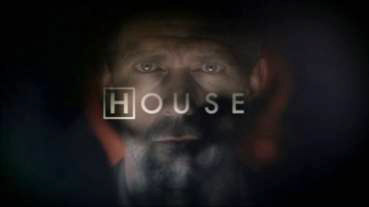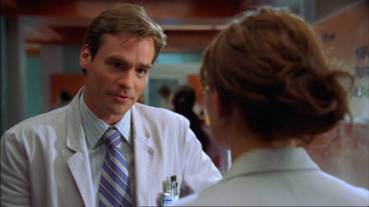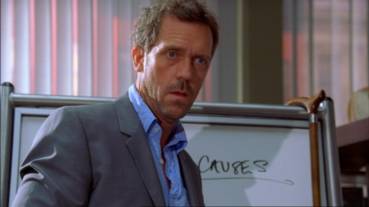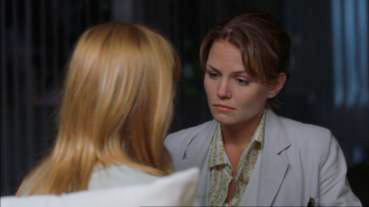"The
game is an itchy foot..." |
A
symptom noted by Hugh Laurie as the
irascible and Holmesian House, M.D. |
Twenty years ago I got on a plane with a fever. Yes, OK.
I had the fever, not the plane. I was flying to California
so for many hours I was in a perfect incubatory environment
to just get worse and worse. By the time I landed I could
hardly stand. My employers did the wise thing; shut me in
a spare bedroom and plied me with chicken soup until I was
through it. It was something of an enforced holiday from
life itself but I had the perfect companion in those weeks
of ever decreasing shivering misery, a book on a reachable
shelf. Those who read voraciously probably have a mental
list of works they really feel they should get around to
devouring. In unguarded moments, weaker readers (like myself)
reach for Dan Brown, the literary equivalent of KFC. We
all know the more worthy tomes because they have seeped
into our culture in many guises. Endless TV adaptations
of Pride and Prejudice have still not prompted
me to pick up Austen and lavish budgeted Russian epics have
not managed to get me page-turning Tolstoy. In my recovery
room was a single weighty tome that presented itself as
my only distraction while my body slowly drove out the offending
illness. It was one of the works on the list.

One
very famous literary character has been played on screen
by hundreds of actors (I believe Tarzan is as multi-performed
and I still haven't read a single one of the twenty-six
the original Rice-Burroughs novels). This character's methods
and persona were as well known to the non-reading population
almost as much as they were to those steeped in his Strand
magazine origins. For that you probably have to thank Basil
Rathbone and Nigel Bruce for their movie interpretations
of the character and his loyal sidekick. Before the fever,
I was in the former population group – movie fed only. Post-illness,
I had become a member of the latter. I was yet another devotee
of the literary Sherlock Holmes, Arthur Conan-Doyle's cold
and calculating detective, to the extent of visiting the
Reichenbach Falls in Switzerland, the real location of his
faked death. There is a rather delicious irony in there
being a TV doctor based on Sherlock Holmes currently enjoying
massive popularity in the US. Conan-Doyle's detective was,
in point of fact, based on a real doctor. How's that for
neat? Dr. Joseph Bell, of Edinburgh's Royal College of Surgeons,
even wore a deer-stalker while bird watching. The ironies
pile up further as House's lead actor's
father was a real honest-to-goodness doctor (earning significantly
less per annum than his pretend-doctor son. Only on planet
Earth, folks, can you earn fifty times more by faking public
service than by actually practising it).
I
think I read (and possibly re-read) every Holmes story in
that two-week period. I was dazzled by the enormous pleasure
I had reading them and was terribly touched by the reverence
and even love that his sidekick Watson managed to squeeze
out between the lines (each story is told from Watson's
point of view and is usually centred on a crime and its
investigation). The tales usually end with Holmes – by virtue
of deduction and acute observation – theatrically revealing
himself to be unlike ordinary men and solving the case with
a flourish. Yes, crime fiction is usually loaded in favour
of the errant genius at its centre but like Doctor
Who (stay with me), Holmes has a moral core that
is unassailable. Holmes didn't always play by the book (the
one written by the letters of the law) and often made judgements
that set murderers free (oh, how wonderful is the climax
of The Devil's Foot)? But he was always – within
the society in which he operated – morally right and hang
the rules. It's this trait more than any of the other playful
nods to the detective in the rather excellent US medical
drama House, which cements its bond with Holmes. It is,
in fact, the House key to Sherlock, so
to speak.
Those
playful nods to Conan-Doyle, when caught like Monarchs in
a net, were brightly coloured targets for Holmes devotees
to knowingly grin at. During its first season run on Channel
5 in the UK, I suddenly clicked with the Holmes connections
and felt quite smug until I wikipedia'ed the show and discovered
my personal epiphany was old news. House is a synonym of
Holmes of course and his best friend is Wilson rather than
Watson (remember Watson was also a doctor if not a cancer
specialist oncologist). House lives in an apartment numbered
221B and is a habitual drug taker (even the moral absolutist,
Sherlock Holmes, did recreational cocaine abuse. It was
necessary, he reasoned, in those moments of acute boredom
when his massive intellect was a powerful engine running
on empty). House takes opiate painkillers for another reason.
After a misdiagnosis, he was treated to the experience of
going through muscle death, an infarction in his right leg
(tissue demise due to the lack of oxygen rich blood). When
you actually see the wound (in the episode Skin
Deep, 29 minutes and 10 seconds in) you begin to
understand what it must be like to live with that amount
of pain. Ow. Watch enough episodes back to back and you
end up limping. Maybe that's just me but it's true.

The
walking stick, pain and limp are as much part of his character
as the pipe and deer-stalker were for Holmes. I'm not sure
about Holmes and prostitutes (nothing in the written word
subtext as far as I could gather) but House isn't afraid
to avail himself of their uh, distracting services. The
subtler nods are far more satisfying. In the opening credits,
our first glimpse of the man is through an x-ray. In the
pilot the name of the patient is stencilled in the top left
of the x-ray – 'Adler'. The very first Sherlock Holmes short
story starts with the lines "To Sherlock Holmes she
is always THE woman. I have seldom heard him mention her
under any other name. In his eyes she eclipses and predominates
the whole of her sex." And do you want to guess 'THE'
woman's name?
"The
universe always settles the score," says House. "Does
it?" comes the reply. "No... but it should."
Which is where House comes in. House himself is a misanthropic,
cold-hearted bastard who sees diseases as logic puzzles
to solve. His honesty and withering criticisms are as raw
as blow-torch blistered flesh but importantly they are also
true, sickening, jaw dropping and in turn hilarious. If
Bill Hicks passed a medical exam, he'd be House. His and
his fellow characters' smarts are played front and centre.
It's a show that makes you feel like you could keep up with
these massive intellects. Medical terms fly by so fast,
but again, nothing needs to be fully understood to fully
engage. As in The
West Wing, you feel the actors have to be at
least as smart as the characters they are portraying. House's
genius is kept in practical check by his boss, Cuddy (played
by ex-West Wing high priced call-girl,
actress Lisa Edelstein) and his diagnoses deliberated with
three super-smart specialists, Chase (the put upon Aussie,
Jesse Spencer), Foreman (the put upon black guy, Omar Epps)
and the beautiful but damaged Cameron (the soft touch, touchy-feelie
one, Jennifer Morrison. Who's put upon). House's 'Dr. Watson'
or Wilson is played by an all grown up Robert Sean Leonard
who's lodged in my brain as the poor kid with the delectably
nasty Kurtwood Smith as a father in Dead Poet's
Society.
The
writing is super-slick, cynical and funny and the performances
are across the board utterly convincing. The biggest magic
trick of all is how on Earth did the simpering Prince Regent
of Black Adder III ("The Prince and
the Porpoise" indeed) land the choicest role on American
television? The dim but well meaning Bertie Wooster is a
far cry from the scheming, uncompromising cad of Princeton
Plainsboro Teaching Hospital. There's only one explanation.
Hugh Laurie is a damn fine actor with reserves of pain and
cynicism to draw on not to mention a flawless American accent.
He broods very attractively on film (and it is film, not
HD). Laurie is a treat to watch, plain and simple, even
though he manages to play House with an almost mystical
power of not being held in any way accountable for his outrageous
actions.

This
is the aspect of the show that plants it in the fantasy
category. A friend of mine – a senior nurse – has a problem
watching the show for this very reason. Like Futurama's
Bender or even Homer Simpson, we know that House is immune
to lasting change and we just love it when he whips the
bedclothes off to reveal shrunken testicles to prove a point.
His theatricality is another thing he has in common with
his Victorian counterpart. My favourite moment in season
two involves him in a lift trying to find a tick that's
pumping poison into a young girl's body. Let's just say
the tick was to be found inside her body (but accessible
to gloved fingers) and that the girl was played by Buffy
Summer's sister Dawn (Michelle Trachtenberg). The offending
tick in this case was found at the crack of... no. Let's
not but it was fun to speculate if any of the crew came
to the same conclusion.
In
season one, House's format doesn't change
but like all US dramas, the arcs just keep sparking. Late
in the season we are introduced to an over the top bad guy
in the form of Vogler, a businessman with a hundred million
to give to the hospital. He's right out of 'Bad Guys Inc.'
and is not a good enough or three dimensional enough a villain
for House to eventually beat and humiliate satisfactorily.
We are introduced to House's ex-wife Stacy, something that
sets up the main arcs that run through the second season.
And it's a cracker. Seventeen and a half hours of comfort
TV. At HMV, the box set is/was on offer at twelve pounds
– that's fifty pence an episode, a bargain. Of course, House
is not challenging TV but as an example of just how good
intelligent TV can be, it's a great example. Yes, it's formulaic
but that's part of its comforting nature. House's clinic
duty (something his boss says that to avoid, he'd give his
own mother herpes) is a constant delight to us and a dull
routine for him. But invariably (as in formulaic TV) the
sub-story leads to the resolution of the main story, or
'disease of the week'. It doesn't shirk from the vomit,
blood and CG medical zoom-ins (how come CG blood looks like
fruit pastilles?) but neither does it shrink from making
House really caustic and sometimes howlingly politically
incorrect. House's creator, David Shore
praises Laurie's skill, a talent that allows the writers
to go as nasty as they like because Laurie can pull it off.
As Laurie says in interviews, House doesn't care if people
think badly or well of him. From an acting point of view
(a profession notoriously sensitive about what people think
of you), that's manna from heaven.
The
arcs in season two involve House's unfinished business with
his ex-wife (the bounder breaks into her therapist's office
and photocopies her file just to slink under her psychological
radar, what a bastard!) and the deterioration of Wilson's
marriage effectively turning Holmes and Watson into Felix
Ungar and Oscar Madison (or The Odd Couple).
The actors riff off each other so comfortably it's no surprise
to learn the men are close friends off set as well as on.
It's in these scenes that you begin to understand the oft-heard
criticism – that House is emotionally eight years old. There's
a scary two parter for one of House's team and a very satisfying
episode titled House vs. God and I'll let
you fill in those blanks. In this episode House's reading
of his best friend is perilously close to someone too close
to me for comfort. It made me squirm watching it. You even
get a humdinger of a cliff-hanger with some H.P. Lovecraft
gore sprinkled liberally and sometimes jet propelled. The
final episode will make the male inside you wince. More
than once.

The
overall direction and production values are top notch. The
incidental music (American Beauty-lite)
fits snugly coating over the seeming harshness with tinkly
piano soothing undertones. This is to assure nervous viewers
that House's heart is in the right place despite his obnoxious
nature. Massive Attack's rather brilliant 'Teardrop' (sans
lyric) – House's main theme – is featured
on the DVD but curiously not on broadcast in certain territories.
All those complex rights issues. T'chah. This series has
something else that a lot of shows do not have; a uniformity
of excellence. There's not a Spock's Brain among them...
Highly recommended.
Originated
on 35mm film (which I have to say surprised me given the
industry's love affair with High Definition) and presented
in 1.78:1 anamorphic, the picture looks gorgeous. Deep blacks,
rich colours and contrast levels by the book. There are
even many instances of creative lighting using a broader
colour palette than is usual on US TV.
The 5.1 Dolby Digital
soundtrack is really subtle. Yes, it's a show dependent
on dialogue (very faithfully reproduced) but when the sub
woofer creeps in and the rear speakers start to push, you
really are drawn in. In the episode Distractions,
House hallucinates after a shower and the music and effects
really envelop you, so much so that you think you start
seeing things yourself. I love it when the film-makers use
the tools properly. It's kind of an anti-Michael Bay style...
I like it.
Disc
1:
Crew Commentary on episode Autopsy
Executive
Producers David Shore and Katie Jacobs on the yak track.
Weird but with Commentary OFF, the main theme is replaced
by the end theme (those rights issues again). Nice to note
that the writers and execs encourage the cast to improvise.
It's hardly surprising that Hugh Laurie comes forward with
character ideas but nice to know they riff off each other
too. Jacobs often stops the commentary to enjoy the show
– perverse but cute in its way. Let's just say they do not
incessantly witter on. "It's all based on stories of
really stupid people..." says Shore of the patients
that test House's own. Also good for the execs to acknowledge
the difficulties of showing a nine year old cancer patient
wanting, and getting, a real kiss from Chase. It's a moral
minefield (it couldn't be just a peck) but everyone pulls
it off tastefully. "Nothing better than writing for
a guy who's so obnoxious..." Shore has a point there.
It was also a surprise to find out that Elvis Costello recorded
especially for the show. He must be a fan. If I had to sum
up this commentary, 'dry' would be the word but what do
you expect from the folks who make this kind of show. Dry
is good.
Disc
5:
Blooper Reel
Pretty
amusing 5 min 22 sec line screw-ups and general tomfoolery.
Hate to say it yet again, but that looks like a fun set.
Alternate
Takes (1) Daddy's Boy & (2) Sleeping Dogs Lie
An
odd but funny alternate line read on two scenes from two
shows. Edelstein and Morrison perform their roles as California
airheads (everything is 'like' and 'totally' and 'cool').
It's more of an arched eyebrow curiosity, obviously an in-joke
for the girls.
It Could be Lupus
An utterly meaningless compilation of all the season's announcements
of the ever-quoted and never blamed condition of Lupus (the
auto-immune system of the body biting into that which it's
meant to protect).
Disc
6:
An Evening with House (18m 19s)
Cast and crew do a Q&A on the genesis of the series;
"What do doctors really think of their patients and
let's have them say it in front of their patients..."
Robert Sean Leonard argues that theirs is not a Holmes/Watson
relationship. It's more like Pooh and Tigger. Cute. Also
good to hear Laurie's take on TV characters essentially
remaining who they are (like life)...
Crew
Commentary on episode No Reason
"Just turn the damn pancake over..."
Executive Producers David Shore and Katie Jacobs again on
the commentary track. Not wearing any clothes apparently.
Show creator David Shore is doing a Joss Whedon (writing
and directing the season closer) and their smarts and humour
come through but again it's sparse. It's also good to realise
that the film-makers load in metaphor (visual as well as
words) and have the time to do such work. In this episode's
case, repeated viewings are rewarded with a whole slew of
incidental detail that Shore gently mocks as they were his
ideas.
House
is American TV at its most formulaic but also bite-sized
satisfying. The nature of House is cheerfully refreshing
despite the fact he's staunchly moral. His rough edges and
sometime devastating demeanour are aspects to a memorable
character that US TV does not usually push to the front.
I'm trusting where the show is going (season three's six
episode arc of House verses the cop Tritter is particularly
satisfying) because of the talent behind the camera. What
will stop it dead in its tracks is semi-permanent romance
between the leads and I read somewhere that Shore is setting
up a House/Cuddy pairing up. That could be the end of House
as we know it but I'm more than willing to keep watching.
|